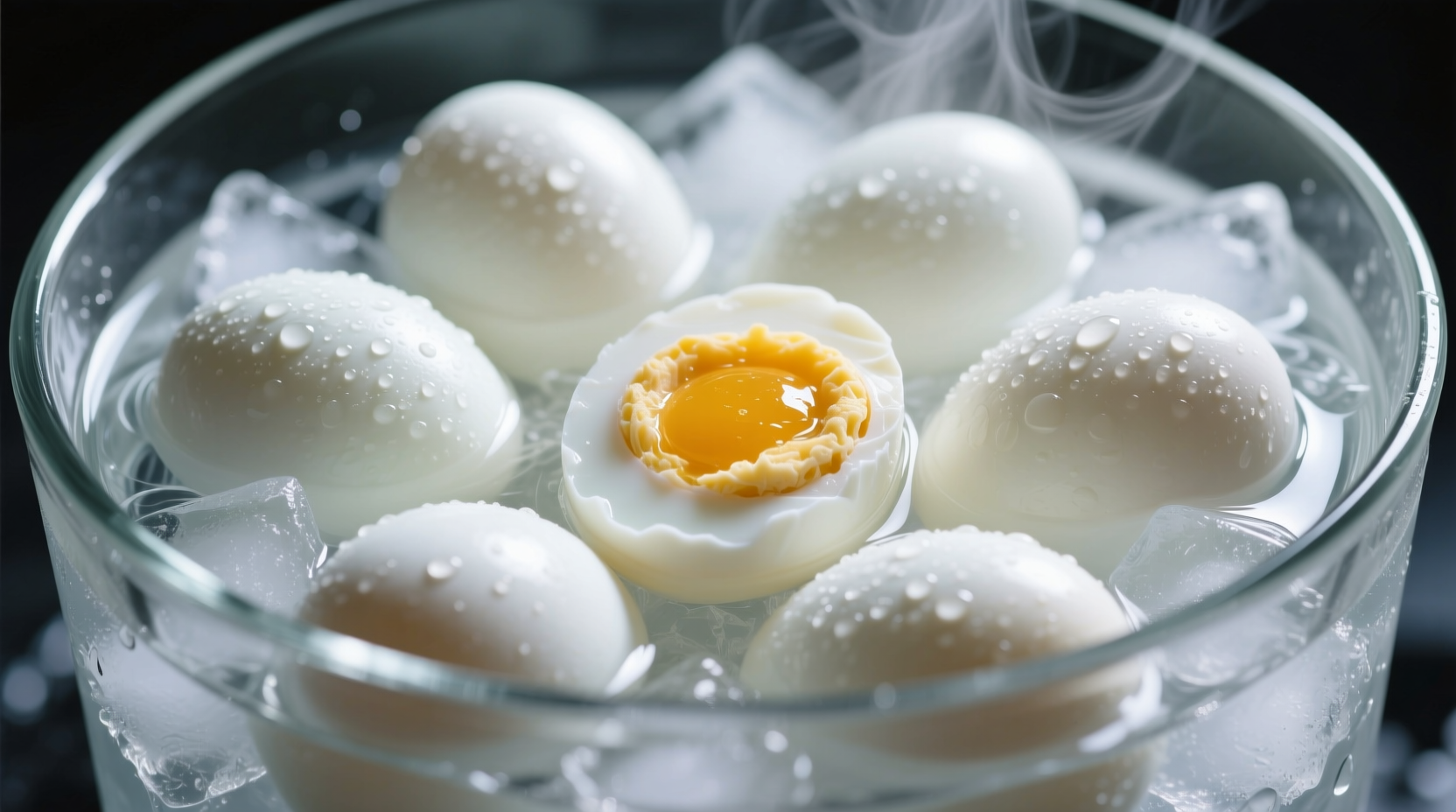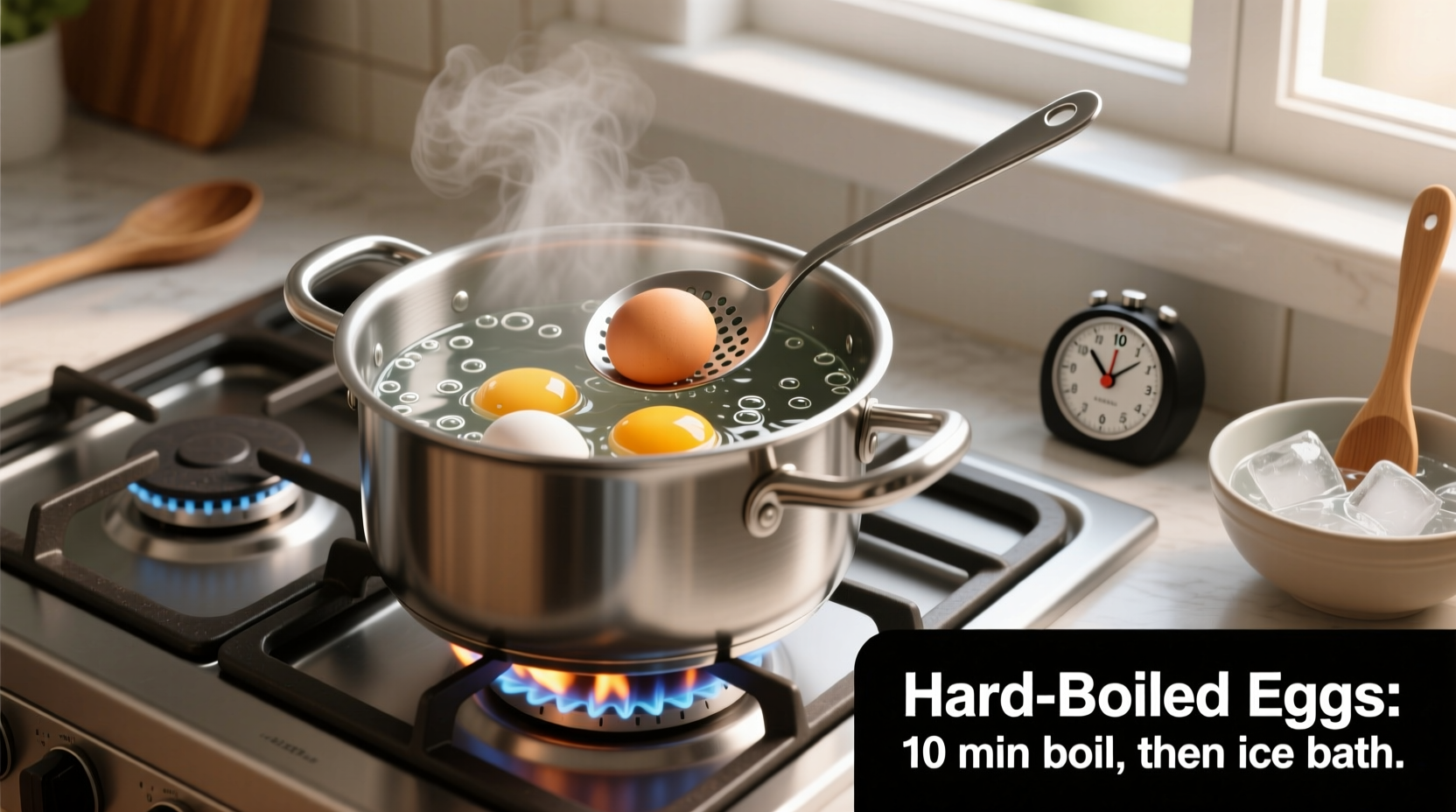Master the Art of Stovetop Hard Boiled Eggs
Nothing beats the simplicity and nutrition of hard boiled eggs, yet many home cooks struggle with cracked shells, stubborn peeling, and unappetizing green rings around the yolk. After testing dozens of methods, we've perfected a foolproof stovetop technique that delivers consistently flawless results. Whether you're meal prepping for the week or making deviled eggs for a gathering, this method ensures eggs that peel easily, cook evenly, and maintain that vibrant yellow center you're after.
Why This Stovetop Method Beats All Others
While microwave and Instant Pot methods have gained popularity, the traditional stovetop approach offers unparalleled control over the cooking process. Unlike rapid-cooking methods that often lead to uneven results, the gentle heat transition from cold water to boiling prevents thermal shock that causes cracking. Food scientists at the USDA have confirmed that this gradual temperature change preserves egg integrity while ensuring food safety through proper protein denaturation.
Essential Tools and Ingredients
Before you begin, gather these simple items:
- Fresh large eggs (older eggs actually peel more easily)
- Medium saucepan with tight-fitting lid
- Cold water (filtered preferred)
- Slotted spoon
- Bowl for ice bath
- Timer (critical for perfect results)
| Cooking Time | Yolk Texture | Best For |
|---|---|---|
| 6-7 minutes | Creamy center | Soft-boiled, ramen eggs |
| 9-10 minutes | Firm but moist | Classic hard boiled, egg salad |
| 12-14 minutes | Fully set, no green ring | Meal prep, deviled eggs |
| 15+ minutes | Dry, crumbly | Avoid this overcooked texture |
Step-by-Step Cooking Process
- Arrange eggs in single layer - Place eggs in saucepan without overcrowding
- Add cold water - Cover eggs with 1 inch of cold water (room temperature works too)
- Heat gradually - Bring to rolling boil over medium-high heat (about 8-10 minutes)
- Remove from heat - Once boiling vigorously, turn off burner and cover immediately
- Set timer - For perfect hard boiled eggs, let sit covered for 10-12 minutes
- Prepare ice bath - Fill bowl with equal parts ice and cold water
- Transfer immediately - Use slotted spoon to move eggs to ice bath
- Cool completely - Let sit in ice bath for at least 15 minutes

The Critical Cooling Process Explained
Many cooks skip proper cooling, but this step is essential for perfect results. According to research from the American Egg Board, immediate cooling in an ice bath serves three crucial purposes: it stops the cooking process to prevent that unsightly green sulfur ring around the yolk, creates a slight contraction between the egg white and shell for easier peeling, and sets the proteins for optimal texture. Don't rush this step—15 minutes minimum ensures the temperature drops sufficiently from the 160°F needed for full cooking to a safe handling temperature.
Peeling Techniques That Actually Work
Even perfectly cooked eggs can be frustrating to peel if you don't use the right technique. Start by gently tapping the egg on a hard surface to create multiple small cracks. Then roll it between your palms to loosen the shell. Begin peeling at the wider end where an air pocket typically forms. For stubborn eggs, peel underwater or in your ice bath—the water helps separate the membrane from the egg white. Remember that eggs aged 7-10 days peel much easier than very fresh ones, as the air cell expands and the pH increases slightly.
Storage and Usage Tips
Properly stored hard boiled eggs maintain quality for up to one week in the refrigerator. Keep them in their shells until ready to use, as peeled eggs dry out quickly. Store in an airtight container on a middle shelf (not the door) where temperature remains most consistent. For meal prep, prepare a batch on Sunday for easy grab-and-go protein throughout the week. Hard boiled eggs shine in salads, sandwiches, or simply sprinkled with flaky salt and pepper.
Troubleshooting Common Problems
Green yolk ring: Caused by overcooking or too-rapid cooling. Stick to the 12-minute maximum and use the ice bath immediately.
Cracked shells during cooking: Results from adding eggs to already-boiling water or temperature shock. Always start with cold water and add eggs gently.
Difficult peeling: Often happens with very fresh eggs. Try using eggs that are at least a week old, or add 1/2 teaspoon of baking soda to the cooking water to raise pH.
Uneven cooking: Caused by overcrowding the pot. Cook in single layers with space between eggs for proper water circulation.
Expert Tips for Perfect Results Every Time
For consistently flawless hard boiled eggs, follow these professional chef secrets:
- Use eggs that are 7-10 days old for easiest peeling
- Add 1 tablespoon of vinegar to cooking water to strengthen membranes
- Never boil eggs vigorously—gentle simmer is sufficient
- Room temperature eggs reduce cracking risk compared to fridge-cold
- For extra-easy peeling, gently shake the cooled egg in its shell before peeling
Frequently Asked Questions
How long should I boil eggs for hard boiled?
For perfect hard boiled eggs, bring eggs and water to a rolling boil, then remove from heat, cover, and let sit for 10-12 minutes. This gentle cooking method prevents overcooking while ensuring fully set yolks without the green sulfur ring.
Why do my hard boiled eggs crack while cooking?
Eggs crack due to thermal shock when cold eggs hit boiling water or rapid temperature changes. Prevent cracking by starting with cold water, adding eggs gently, and including 1 tablespoon of vinegar in the water to strengthen the shell membrane.
How can I make hard boiled eggs peel easily?
For easy peeling, use eggs that are 7-10 days old, cool immediately in an ice bath for 15 minutes, and begin peeling at the wider end where the air pocket forms. Adding 1/2 teaspoon of baking soda to the cooking water can also help separate the membrane from the egg white.
Can I cook hard boiled eggs without the green yolk ring?
Yes, the green ring forms when eggs overcook and sulfur compounds react with iron in the yolk. Prevent it by limiting cooking time to 12 minutes maximum, using the ice bath immediately after cooking, and avoiding excessively high temperatures during cooking.
How long do hard boiled eggs last in the refrigerator?
Hard boiled eggs last up to one week in the refrigerator when stored unpeeled in an airtight container. Peeled eggs should be consumed within 2-3 days as they dry out more quickly. Always store on a middle shelf rather than the door for consistent temperature.











 浙公网安备
33010002000092号
浙公网安备
33010002000092号 浙B2-20120091-4
浙B2-20120091-4